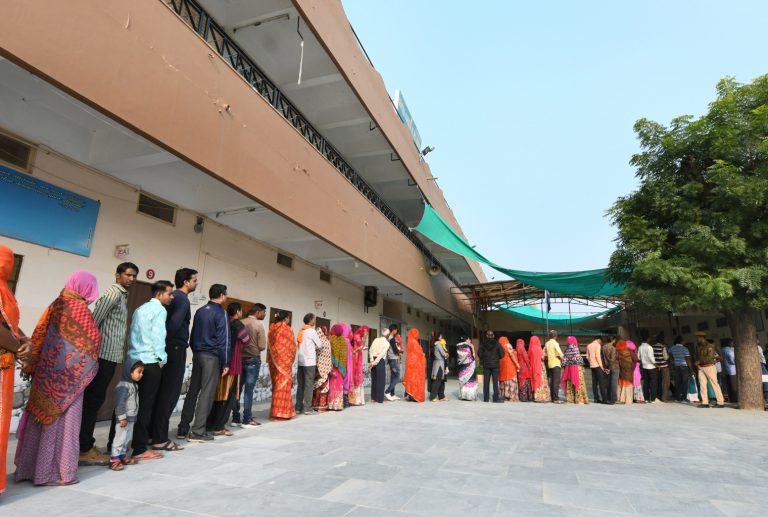India’s Election Commission Developing Blockchain System for Voting
source: Bitcoin News
2020. Feb. 16. 12:50

The Election Commission of India is collaborating with the Indian Institute of Technology to develop a blockchain system for voting, the Chief Election Commissioner has reportedly revealed. The new system aims to allow Indians to vote even when they are away from their hometowns. Furthermore, the commissioner has proposed to link voter IDs with Aadhaar.
Also read: Bitcoin, Tesla Stock, Tron: How Warren Buffett Got His First Bitcoin
Using Blockchain System for Voting in India
Chief Election Commissioner Sunil Arora said at the Times Now Summit on Wednesday that the Election Commission (EC) was close to solving one of the biggest voting problems in the country, the Times of India reported. Many people do not vote because they are unable to get to their polling booth on voting day. According to reports, about 900 million people were eligible to vote in the 2019 elections but a third of them, or about 300 million people, did not vote largely due to this reason. The commissioner elaborated:
The EC is working with the Indian Institute of Technology, Chennai, to develop a blockchain system that will allow voters registered in any part of the country to exercise their franchise even after they move cities.
According to the publication, over 450 million people in India have moved from their hometowns for reasons such as jobs, education, or marriage. During the opening session of the summit, Arora said he was hopeful that the blockchain system would be put in place during his tenure, adding:
Chief Election Commissioner Sunil AroraA proposal to link voter IDs with Aadhaar, pending with the Ministry of Law, would be on the agenda during the EC’s February 18 deliberations on electoral reforms with the ministry.
Blockchain for Voting in Other Jurisdictions
Voting has been one of the most-explored use cases of blockchain technology in many jurisdictions. The Indian state of Telangana, for example, is exploring the use of this technology in this area. In its “Blockchain Policy” report, published in May last year, the state government emphasized that “Blockchain has relevancy in a wide variety of areas, including tax filing, voting, land registry, healthcare, creating tamper-proof voting records, vehicle registries, fraud-proof government benefits disbursements, and digital identities for individuals, such as refugees, who lack government-issued identity documents.”
In the U.S., several state and local governments have also been exploring using blockchain technology for voting. In 2018, West Virginia began allowing certain voters to submit their ballots using the technology via an app called Voatz. Pierce County in Washington state is also using this app in its blockchain voting pilot. Ohio has identified two key public sector blockchain applications: property record management and voting. The government of Chandler, Arizona, is also exploring using a blockchain to allow registered voters to cast their ballots electronically. “It would empower voters that may not otherwise be able to make it to the polls have their voice heard,” the city explained.
In a report published in June last year, the California Senate Office of Research wrote:
The potential security benefits of blockchain technology have led to several proposals to apply it to an array of voting applications, from securely storing voter rolls to allowing voters to record their votes remotely through an app.
However, the report points out that cybersecurity and election experts “have expressed skepticism, saying the online platforms are no more secure than other online ballots. They are concerned that blockchain addresses only the security of a cast ballot but does not help to authenticate voters or the security of voters’ devices. Others have raised concerns that Internet voting systems cannot be audited with a level of confidence comparable to physical polling places.”
Do you think India should use a blockchain system for voting? Let us know in the comments section below.
Disclaimer: This article is for informational purposes only. It is not an offer or solicitation of an offer to buy or sell, or a recommendation, endorsement, or sponsorship of any products, services, or companies. Bitcoin.com does not provide investment, tax, legal, or accounting advice. Neither the company nor the author is responsible, directly or indirectly, for any damage or loss caused or alleged to be caused by or in connection with the use of or reliance on any content, goods or services mentioned in this article.
Images courtesy of Shutterstock and the Election Commission of India.
Did you know you can buy and sell BCH privately using our noncustodial, peer-to-peer Local Bitcoin Cash trading platform? The local.Bitcoin.com marketplace has thousands of participants from all around the world trading BCH right now. And if you need a bitcoin wallet to securely store your coins, you can download one from us here.
The post India’s Election Commission Developing Blockchain System for Voting appeared first on Bitcoin News.





